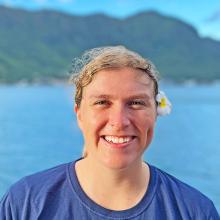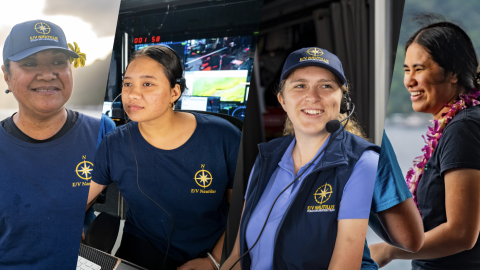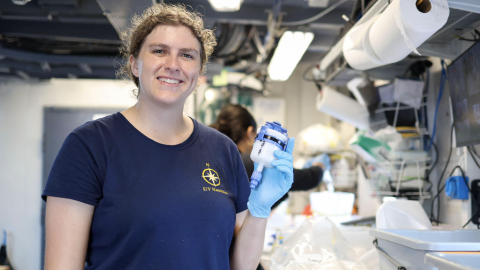
Ella Ashford
Tell us about your work/research. What kinds of things do you do?
I specialize in developing and utilizing technology, such as Remotely Operated Vehicles (ROV), Unmanned Aerial Vehicles (UAV), and Geographic Information Systems (GIS), to help answer scientific questions. This often involves fieldwork to collect data which includes going out on boats to conduct ROV operations or hiking to remote locations to fly drones. Once we have collected enough information in the field, my work usually takes me to computer labs to process different forms of information into maps and models that can help characterize certain features like coral reef structures or archaeologically significant marble quarries. These experiences have taken me all around the world including studying oceanography in New Zealand, flying drones in Greece, and operating ROVs in American Samoa. Recently I have expanded my research interest to include qualitative data collection related to understanding how education can impact how people engage in ocean stewardship. This involves conducting interviews, surveys, and workshops. It is a big change from what I have done in my previous research but adds new viewpoints that emphasizes the importance of local knowledge. I believe that it is very important to look at projects through a multidisciplinary lens, weaving together different methodologies and forms of knowledge.
What sparked your initial interest in your career?
Growing up on a sailboat in Hawaiʻi, I had a front-row seat to witnessing climate change impacts on island communities. I watched as high tides swallowed the fixed harbor docks due to sea level rise, coral bleaching impacted local reefs, and political conflicts erupted over coastal resources. This connection with the ocean and my curiosity about the undersea world led me to get involved in the MATE ROV Competition, an international underwater robotics event for students. I fell in love with the challenge of completing underwater scientific tasks using an ROV, troubleshooting technical difficulties under strict time limits, and presenting our solutions to expert judges. But that ‘aha’ moment really came when we were testing our ROV in the ocean. In between the awe of watching marine creatures swim past our cameras also came the disappointment of seeing the seafloor littered with trash and marine debris. That was the moment where I remember thinking to myself that my team could go beyond simulated competition challenges and use the technology that we had developed to make a difference in our local communities through ocean stewardship. These experiences led me to define my career ambitions in ocean sciences with a focus on leveraging technology to understand the ways that coastal communities and Pacific islands can protect their marine resources while adapting to climate change.
Who influenced you or encouraged you the most?
My family has always been my biggest supporters, and without them I would not be on this path. My environmental science professors at Willamette University, especially Dr. Scott Pike, have been instrumental in fostering my love of learning and confidence to pursue new opportunities. Lastly, the staff at both the Olympic Coast National Marine Sanctuary and National Marine Sanctuary of American Samoa gave me the chance to dive into this world of ocean science. Finding my community of mentors, teachers, and friends has been the foundation for my current work.
What element of your work/study do you think is the most fascinating?
I love that moment when you are piloting an ROV, and a sea creature appears right in front of your camera. The excitement becomes palpable, and you have this moment of shared curiosity. It doesn’t matter if you are a student or a scientist, ocean exploration has a way of unlocking a childlike wonder that inspires motivation to protect these incredible ecosystems.
How did you get involved with the Ocean Exploration Trust?
This summer I have been working at National Marine Sanctuary of American Samoa (NMSAS) on the science team as a NOAA Ernest F. Hollings Scholar. Through my internship, I have been focusing on expanding the ROV capabilities of the sanctuary by developing ROV-based methodologies to categorize coral reefs, and leading a ROV education workshop for teachers. The Nautilus’ expedition is big news here in American Samoa and the sanctuary has been involved in planning various education as well as scientific projects. I was offered the opportunity to participate by NMSAS Research Coordinator Val Brown, NMSAS Superintendent Atuatasi Lelei Peau, and Ocean Exploration Trust Chief Scientist Daniel Wagner. I am beyond excited for the experience of participating in the E/V Nautilus expedition as a scientist and am grateful for my mentors at the sanctuary who have opened these amazing doors for me!
What other jobs led you to your current career?
I have had the chance to work in many interdisciplinary positions that have helped lead me to my current research. I have particularly enjoyed working in positions that blend both scientific research and community outreach. A few of my favorite projects include collaborating with the Olympic Coast National Marine Sanctuary to host a MATE ROV Competition, serving as a lead researcher on developing new community-driven methodologies to remove derelict fishing gear using ROVs, and participating as a Willamette University research assistant on a county-wide environmental health hazards and threats assessment to inform climate resilience plans. One of the most impactful research experiences I have had was on an NSF-funded International Research Experience for Students (IRES) project where we studied ancient marble quarries in Greece using Unmanned Aerial Vehicles (UAV). What I remember most about the experience, even though the research was incredible, is the team that I was with and the support we gave each other throughout challenging fieldwork. Lastly, I have worked as an outdoor program instructor which has given me a strong foundation in communication, risk management, and leading remote field activities.
What are your degrees and certifications?
Bachelor of Science in Environmental Science & Bachelor of Arts in Archaeology – Willamette University 2025
What are your hobbies?
The ocean has always been a big part of my life and as a result I love surfing, sailing, and swimming! I also enjoy going hiking and backpacking in my favorite National Parks, Yosemite and the Olympics. When I am not engaged in outdoor activities you can find me curled up with a book or solving puzzles with friends.
What advice would you give someone who wants to have a career like yours?
I would encourage them to not be afraid to go off the beaten path to create one's own opportunities. This could be designing their own research or pursuing new skills in their downtime. Additionally, don’t hesitate to apply for something even if you don’t meet all the requirements as long as you are willing to put in the work to learn new skills. Basically, put yourself out there and try new things!
Expeditions
Ella participated in the following Ocean Exploration Trust expeditions:


